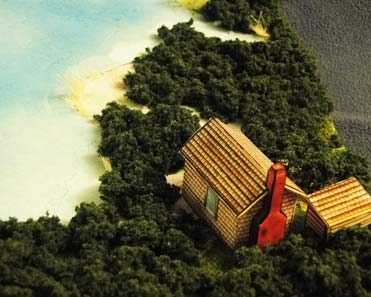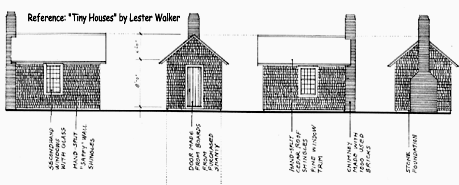
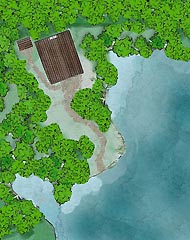
Henry David Thoreau's
Cabin at Walden Pond
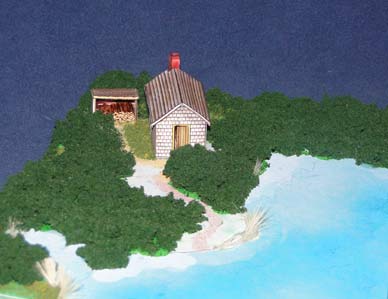 |
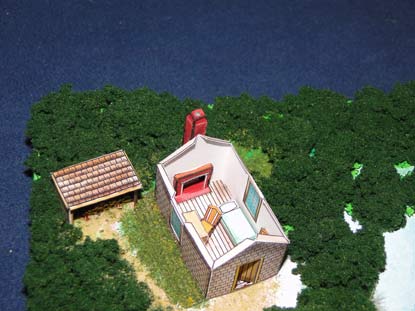 |
|
I'd like to share one I put together a couple of months back. I took Thoreau's Cabin Walden Pond and scaled it to fit on the layout unscaled. The furniture was difficult but within the cabin, the defects on the bottom of the chairs are much harder to see. I've been working with railroad scenery materials and tried a few here. I first mounted the layout on a piece of matt board. Then I formed the cabin. I particularly liked the way the fireplace fit in to add external dimension and a hearth with a roaring fire inside. The shed was next. I used Sharpies to color the inside to look somewhat like the outside. I'd done the Maple Sugar Shack a while back and thought up an improvement I tried here. I cut broom straw to the right length and colored the surface with a brown Sharpie. Gluing a stack of those together gave me a wood pile for the shed. With the buildings in place, I added bushes where indicated and selectively added green ground cover, in particular, to cover a narrow rectangle of roof on the layout that the building didn't cover. I matched tall dry grass to the pond reeds as indicated on the layout at well. Three photos of the finished project are attached. Mike Melendez |
Thoreau was a dissenter and a dropout, perhaps the most famous who ever lived. He signed off from the Church. He signed of from the State. "If I had known how to name them:' he wrote, "I should have signed off in detail from all the societies which I never signed on to." He rejected the Establishment and all its trappings. He saw such possessions as fancy clothes and elaborate furniture as so much extra baggage. He demanded a fresh, uncluttered existence with time for self-exploration. He would, he told the world, "breathe after his own fashion."
FG, et al -this is SO cool !
You guys seem to give away so much, it really is a great gift to the world. Just think of all the people that you don't even know that you are making happy. Thanks again. All the best to you, now and always. - andrew
(now, if only i could make a "life size" cabin in the wilderness . . 8/20
Andrew, YOU CAN !!! Just be darn sure to get all the permits and environmental studies..Chip FG
This is a great model, but you have to cut the window and door open to see the inside. I have a series of photos of the completed model with the interior seen through the lower window half and the hinged door, as well as the outside. It was well appreciated by a young lady who had to visit the hospital.
For tips, you might put in that rubbing a "fire" in the cabin or the lens in the light houses with vegetable oil makes the paper translucent. Putting in a black core or backdrop to seal the light, you can put in a mini light bulb or LED for very realistic effects. Ramping LED's that pulse are available, but keep the kids awake so I use a steady light. Dennis
For interest; a friend of mine was artist in residence at Camp Walden for several years, before the dreaded Covid! He painted lots of pictures of the area and the lake, as well as a record of his daily walk to his studio (42 miniature i-pad pieces called 'Simon's Wood' which I bought with a legacy). A few years ago I curated an exhibition for him. To commemorate this I made Thoreau's cabin and miniaturised Martin's painting of Walden pond to go over the fireplace. He loved it! - David
Henry David Thoreau's Cabin at Walden Pond
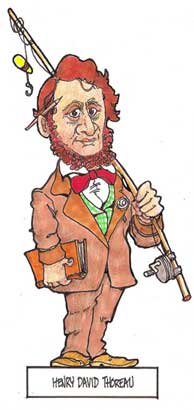
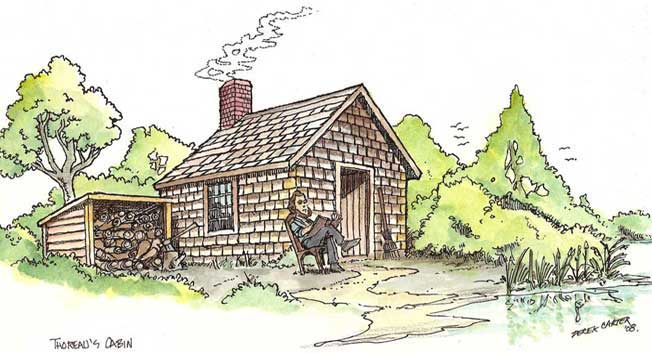
Henry David Thoreau and his Cabin on Walden Pond

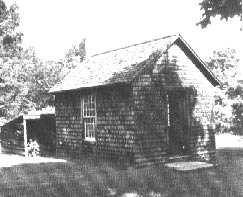 Henry David Thoreau was born on July
l2, 1817 in Concord, Massachusetts. Under the influence of his
brother John, an amateur
ornithologist, he developed an interest in nature and spent much
of his youth exploring the town's ponds and woods.
Henry David Thoreau was born on July
l2, 1817 in Concord, Massachusetts. Under the influence of his
brother John, an amateur
ornithologist, he developed an interest in nature and spent much
of his youth exploring the town's ponds and woods.
Thoreau began his formal education at Concord Academy and continued his studies at Harvard College, which emphasized the classics. An avid reader and note-taker, Thoreau was interested in subjects so diverse as Greek mythology and English ballads.
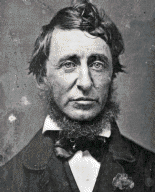 While Thoreau attended Harvard, Ralph Waldo Emerson moved to
Concord to begin his career as a writer and lecturer. Thoreau
admired Emerson's l836 essay, "Nature,"which advanced
the then-unique idea that each individual should seek a spiritually
fulfilling relationship with the natural world.
While Thoreau attended Harvard, Ralph Waldo Emerson moved to
Concord to begin his career as a writer and lecturer. Thoreau
admired Emerson's l836 essay, "Nature,"which advanced
the then-unique idea that each individual should seek a spiritually
fulfilling relationship with the natural world.
After graduating from Harvard in 1837, Thoreau returned to Concord, where he taught school, improved and expanded his family's pencil making business, and engaged in carpentry, stonemasonry and gardening. He began his lifelong friendship and association with Emerson, who introduced him to other writers and nonconformist thinkers who were making Concord the center of new ideas. Among them were Bronson Alcott, Ellery Channing, Margaret Fuller and Nathaniel Hawthorne.
Emerson, who valued Thoreau's practical talents and companionship, invited him to live in the Emerson household. Grief brought them closer together. The Emersons' first son died just two weeks after the death of Thoreau's beloved older brother. Three years later, Thoreau, still suffering from this loss, wanted to live in the woods and embark on a career as a writer. When Emerson offered him the use of a newly purchased woodlot at Walden Pond, Thoreau gladly accepted.
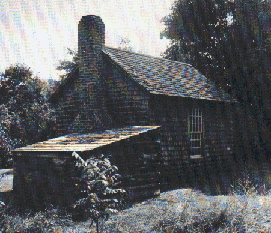 Walden Pond was surrounded by one of the few remaining woodlands
in a heavily farmed area. In March of l845, Thoreau began planning
and building his one-room house. On July 4 of that year, he took
up residence at Walden. He studied natural history, gardened,
wrote in his journal, read, and drafted his first book, A Week
on the Concord and Merrimack Rivers, about an 1839 trip with his
brother. He also made the first accurate survey of the pond. By
no means a hermit, he frequently walked to the village, entertained
visitors at his house, and hired himself out as a surveyor.
Walden Pond was surrounded by one of the few remaining woodlands
in a heavily farmed area. In March of l845, Thoreau began planning
and building his one-room house. On July 4 of that year, he took
up residence at Walden. He studied natural history, gardened,
wrote in his journal, read, and drafted his first book, A Week
on the Concord and Merrimack Rivers, about an 1839 trip with his
brother. He also made the first accurate survey of the pond. By
no means a hermit, he frequently walked to the village, entertained
visitors at his house, and hired himself out as a surveyor.
In September of 1847, Thoreau completed his experiment in simplicity and became "a sojourner in civilized life again." Walden, the book that describes his experiences at the pond, was published in l854.
Thoreau and Emerson agreed that the vacant house should not remain on the site. Thoreau gave the house to Emerson, who sold it to his gardener. Two years later two farmers bought it and moved it to the other side of Concord, where they used it to store grain. In l868, they dismantled it for scrap lumber and put the roof on an outbuilding.
After his Walden experience, Thoreau applied his skills as a
surveyor and pencil maker to earn what little money he needed
for the things that he could not "grow or make or do without."
He spent his free time walking, studying and writing. He also lectured at the Concord Lyceum and elsewhere
in New England, and once traveled as far as Philadelphia.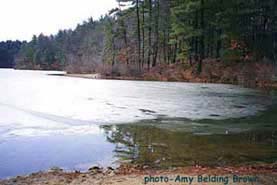
Thoreau became increasingly involved with the social and political issues of his time. He often spoke out against economic injustice and slavery. With other members of his family, Thoreau helped runaway slaves escape to freedom in Canada. His 1849 essay, Civil Disobedience, eventually brought him international recognition.
On May 6, l862, at the age of 44, the "self-appointed inspector of snowstorms and rainstorms" died after a prolonged struggle with tuberculosis. He is buried on Authors' Ridge at Sleepy Hollow Cemetery in Concord.
"I went to the woods because I wished to live deliberately, to front only the essential facts of life, and see if I could not learn what it had to teach, and not, when I came to die, discover that I had not lived. I did not wish to live what was not life, living is so dear, nor did I wish to practice resignation, unless it was quite necessary. I wanted to live deep and suck out all the marrow of life, to live so sturdily and Spartan-like as to put to rout all that was not life,...."
"I intend to build me a house which will surpass
any on the main street in Concord in grandeur and luxury, as soon
as it pleases me as much and will cost me no more than my present
one.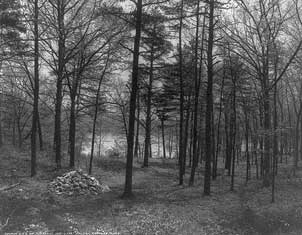 "
"
"How worn and dusty, then, must be the highways of the world, how deep the ruts of tradition and conformity I did not wish to take a cabin passage, but rather to go before the mast and on the deck of the world, for there I "could best see the moonlight amid the mountains. I do not wish to go below now."
Near the end of March, 1845, I borrowed an axe and went down to the woods by Walden Pond, nearest to where I intended to build my house, and began to cut down some tall arrowy white pines, still in their youth, for timber. It is difficult to begin without borrowing, but perhaps it is the most generous course thus to permit your fellow-men to have an interest in your enterprise. The owner of the axe, as he released his hold on it, said that it was the apple of his eye; but I returned it sharper than I received it. It was a pleasant hillside where I worked, covered with pine woods, through which I looked out on the "pond, and a small open field in the woods where pines and hickories were springing up."
.......I left the woods for as good a reason as I went there. Perhaps it seemed to me that I had several more lives to live, and could not spare any more time for that one."
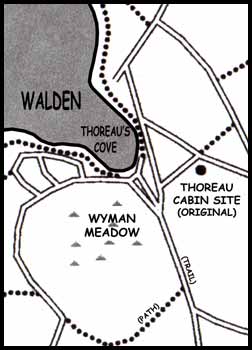 Our life is frittered away by detail. An honest man has
hardly need to count more than his ten fingers, or in extreme
cases he may add his ten toes, and lump the rest. Simplicity,
simplicity, simplicity I say, let your affairs be as two or three,
and not a hundred or a thousand; instead of a million count half
a dozen, and keep your accounts on your thumb nail."
Our life is frittered away by detail. An honest man has
hardly need to count more than his ten fingers, or in extreme
cases he may add his ten toes, and lump the rest. Simplicity,
simplicity, simplicity I say, let your affairs be as two or three,
and not a hundred or a thousand; instead of a million count half
a dozen, and keep your accounts on your thumb nail."
"I know of no more encouraging fact than the unquestionable ability of man to elevate his life by a conscious endeavor. It is something to be able to paint a particular picture, or to carve a statue, and so to make a few objects beautiful; but it is far more glorious to carve and paint the very atmosphere and medium through which we look, which morally we can do. To affect the quality of the day, that is the highest of arts."
"If you have built castles in the air, your work need not be lost; that is where they should be. Now put the foundations under them.."
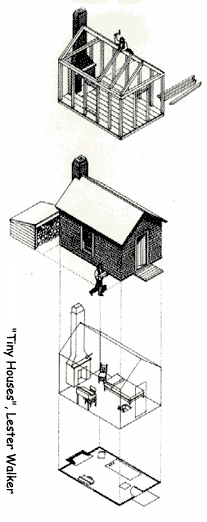 "I hewed the main
timbers six inches square, most of the studs on two sides
only, and the rafters and floor timbers on one side, leaving
the rest of the bark on, so that they were just as straight
and much stronger than sawed ones.
"I hewed the main
timbers six inches square, most of the studs on two sides
only, and the rafters and floor timbers on one side, leaving
the rest of the bark on, so that they were just as straight
and much stronger than sawed ones.
Each stick was carefully mortised or tenoned by its stump, for I had borrowed other tools by this time. My days in the woods were not very long ones; yet I usually carried my dinner of bread and butter, and read the newspaper in which it was wrapped, at noon, sitting amid the green pine boughs which I had cut off, and to my bread was imparted some of their fragrance, for my hands were covered with a thick coat of pitch. Before I had done I was more the friend than the foe of the pine tree, though I had cut down some of them, having become better acquainted with it."
"By the middle of April, for I made no haste in my work, but rather made the most of it, my house was framed and ready far the raising. I had already bought the shanty of James Collins, an Irishman who worked on the Fitchburg Railroad, for boards. James Collins' shanty was considered an uncommonly fine one."
"I have thus a tight shingled and plastered house, ten feet wide by fifteen long, and eight-feet posts, with a garret and a closet, a large window on each side, two trap doors, one door at the end, and a brick fireplace opposite. The exact cost of my house, paying the usual price for such materials as I used, but not counting the work all of which was done by myself, was as follows; and I give the details because very few are able to tell exactly what their houses cost, and fewer still, if any, the separate cost of the various materials which compose them."
"The next winter I used a small cooking-stove for economy, since I did not own the forest; but it did not keep fire so well as the open fire-place. Cooking was then, for the most part, no longer a poetic, but merely a chemic process. It will soon be forgotten, in these days of stoves, that we used to roast potatoes in the ashes, after the Indian fashion. The stove not only took up room and scented the house, but it concealed the fire, and I felt as if I had lost a companion. You can always see a face in the fire. The laborer, looking into it at evening, purifies his thoughts of the dross and earthiness which they have accumulated during the day. These are all the materials excepting the timber, stones, and sand, which I claimed by squatters right. I have also a small wood-shed adjoining, made chiefly of the stuff which was left after building the house."
"Every man looks at his wood-pile with a kind of affection. I loved to have mine before my window, and the more chips the better to remind me of my pleasing work. I had an old axe which nobody claimed, with which by spells in winter days, on the sunny side of the house, I played about the stumps which I had got out of my bean-field. As my driver prophesied when I was ploughing, they warmed me twice, once while I was splitting them, and again when they were on the fire, so that no fuel could give out more heat."
Boards .....................$8.031/2, mostly shanty boards
Refuse shingles for
Roof and Sides..........$4.00
Laths........................$1.25
Two second-hand
Windows & Glass....$2.43
One thousand old bricks .....................$4.00
Two casks of lime .$2.40(That was high).
Hair ........................$0.31(More than I needed).
Mantle-tree iron ...$0.15
Nails ......................$3.90
Hinges& screws....$0 .14
Latch ...................$0.10
Chalk ..................$0.01
Transportation ....$1.40 - I carried a good part on my back
_____________________
"In all ..................$28.12 1/2
These are all the materials excepting the timber, stones, and sand, which I claimed by squatters right. I have also a small wood-shed adjoining, made chiefly of the stuff which was left after building the house."
"I had no lock nor bolt but for the desk which held my papers, not even a nail to put over my latch or windows. I never fastened my door night or day, though I was to be absent several days; not even when the next fall I spent a fortnight in the woods of Maine. And yet my house was more respected than if it had been surrounded by a file of soldiers."
RE: Door mat...."I had no room to spare within the house, nor time to spare within or without to shake it, I declined it, preferring to wipe my feet on the sod before my door. It is best to avoid the beginnings of evil."

"My furniture, part of which I made myself, and the rest cost me nothing of which I have not rendered an account, consisted of a bed, a table, a desk, three chairs, a looking-glass three inches in diameter, a pair of tongs and andirons, a kettle, a skillet, and a frying-pan, a dipper, a wash-bowl, two knives and forks, three plates, one cup, one spoon, a jug for oil, a jug for molasses, and a japanned lamp. None is so poor that he need sit on a pumpkin. That is shiftlessness. There is a plenty of such chairs as I like best in the village garrets to be had for taking them away. Furniture Thank God, I can sit and I can stand without the aid of a furniture warehouse."
"1 would observe, by the way, that it costs me nothing for curtains, for I have no gazers to shut out but the sun and moon, and I am willing that they should look in. The moon will not sour milk nor taint meat of mine, nor will the sun injure my furniture or fade my carpet, and if he is sometimes too warm a friend, I find it still better economy to retreat behind some curtain which nature has provided, than to add a single item to the details of housekeeping."
"Before winter I built a chimney, and shingled the sides of my house, which were already impervious to rain, with imperfect and sappy shingles made of the first slice of the log, whose edges I was obliged to straighten with a plane."
He refused to pay his poll tax on the grounds that he would not support a government which tolerated slavery and which was fighting an unjust war in Mexico. He was thrown into
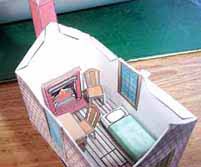 This is a view of the furnishings. The ever alert folk at the Concord Museum yelled at me for taking photos of Henry's writing desk on exhibit.. said something like it was a 'security issue' ..chip |
jail and released the next day when an aunt paid the tax without his consent. From this experience came the essay "Civil Disobedience," Thoreau's classic call for non-cooperation. "Unjust laws exist: shall we be content to obey them, . . . or shall we transgress them at once?" He asked. "I say, break the Law."
"One afternoon, near the end of the first summer, when I
went to the village to get a shoe from the cobbler, I was seized
and put into jail, because, as I have elsewhere related, I did
not pay a tax to, or recognize the authority of, the state which
buys and sells men, women, and children, like cattle at the door
of its senate-house. I had gone down to the woods for other purposes.
But, wherever a man goes, men will pursue and paw him with their
dirty institutions, and if they can, constrain him to belong to
their desperate odd-fellow society."
In 1860 Thoreau caught a severe cold which became bronchitis, then tuberculosis. He died on May 2, 1862. There are two famous deathbed stories, both characteristic of Thoreau's iconoclastic mind. When a meddlesome friend tried to turn his thoughts toward a future life, he said, "One world at a time." When a relative asked whether Thoreau had made his peace with God, he answered, "I am not aware that we have ever quarreled."
In the funeral oration, Emerson lamented Thoreau's lack of ambition. "Instead of engineering for all America, he was the captain of a huckleberry party." But perhaps Emerson was wrong. Thoreau "engineered" for the dissenting minority. He proclaimed the rights of the individual conscience in tones that ring clear today. "We should be men first and subjects afterward," he said.



